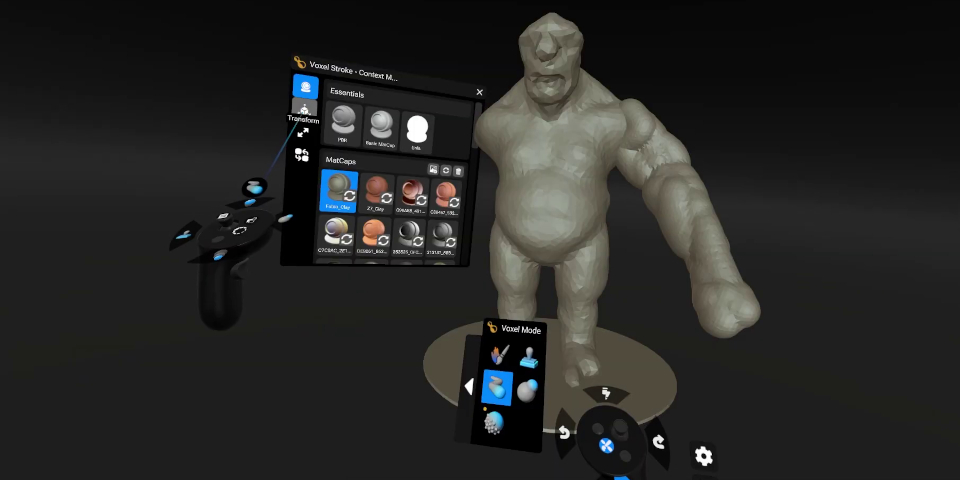Leopoly adds voxel sculpting to Shapelab 2025
html PUBLIC "-//W3C//DTD HTML 4.0 Transitional//EN" "http://www.w3.org/TR/REC-html40/loose.dtd"
Leopoly has released Shapelab 2025 v2.0, the latest version of its VR sculpting software, adding an experimental new voxel sculpting toolset.Other changes include support for cavity masking when painting sculpts, falloff curves for most of the sculpting brushes, and the option to create your own custom 3D stamps.
A polygon-based digital sculpting tool streamlined enough to use in virtual reality
Released in 2023 after several years in early access, Shapelab is designed for sculpting 3D models – primarily organic forms like characters and creatures – in VR or on desktop systems.Unlike tools like Adobe’s Medium and Substance 3D Modeler, it represents 3D models as conventional polygonal geometry, rather than Signed Distance Fields.
Shapelab uses a brush-based sculpting workflow, with a base set of brushes that will be familiar to users of apps like ZBrush, plus the option to use alpha textures as stamps.
Users can adjust the resolution of the mesh locally, via a brush-controlled dynamic topology system, or via a set of global controls.
It is also possible to clone, mirror or perform Boolean operations on geometry to build up more complex forms.
For texturing sculpts, Shapelab includes a vertex painting toolset with support for masks; or users can apply a set of readymade materials.
Experimental new voxel engine lets you model without topological constraints
To that, the latest update – Shapelab 2025 came out last year, so it’s officially Shapelab 2025 v2.0 or just the ‘Spring Update’ – adds support for voxel-based sculpting.The technique, also supported in applications like 3DCoat, represents models as a solid grid of 3D pixels, rather than as polygonal surfaces.
It makes it possible to model without topological constraints, removing the need to subdivide a mesh to add detail, and making it easier to punch holes through objects.
However, it makes it harder to perform other operations, so each approach has its own merits.
Pitched as a quick way to rough out 3D forms
Leopoly pitches Shapelab’s new voxel engine as a secondary toolset, intended primarily for quick sketching and form exploration, and for blocking out rough forms for sculpts.The company describes the release as “laying the groundwork for hybrid workflows that combine the structural precision of polygonal meshes with the fluid sculptability of voxels”.
Still a work in progress, lacking some of the features from the poly modeling toolset
Users can either sculpt voxel objects from scratch, or convert an existing polygonal mesh to a voxel object for editing.In the initial release, the voxel sculpting brushes include Voxel Clay, for adding or removing volume from a voxel object; Inflate/Deflate Voxel, which can be used to draw strokes; and Smooth Voxel, for softening geometry.
It is also possible to use voxel shapes as 3D stamps.
However, the toolset is still officially a work in progress, with known limitations including a lack of support for masks or Boolean operations.
Other changes: cavity masking, falloff curves for brushes, and custom 3D stamps
Updates to existing features include support for cavity masking, which masks a surface according to its local curvature, making it possible to target only cavities or bumps.In addition, “most” of the sculpting brushes now include custom falloff properties, enabling users to control the area of a sculpt they influence by adjusting the falloff curve.
It is also now possible to use custom 3D shapes with the Stamp Tool.
Workflow and interface improvements
Workflow improvements include a new ‘Quick Switch’ shortcut, making it possible to select any object or layer and jump directly into Edit Mode with a single thumbstick gesture.There is also a new quick cursor repositioning system when sculpting, and the Quick Access Wheel pie menu now supports a wider range of actions.
Price and system requirements
Shapelab 2025 is compatible with Windows 10+. Find a list of supported VR headsets here.Perpetual licenses have a standard price of $64.99. Subscriptions now cost $29.99/year, down $30/year since the previous release.
Read a full list of new features in Shapelab 2025 v2.0 in the online release notes
Read more about Shapelab on the product website
Have your say on this story by following CG Channel on Facebook, Instagram and X (formerly Twitter). As well as being able to comment on stories, followers of our social media accounts can see videos we don’t post on the site itself, including making-ofs for the latest VFX movies, animations, games cinematics and motion graphics projects.


